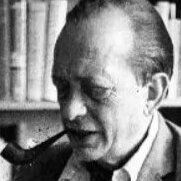Arthur Llewellyn Basham (24 May 1914, Loughton, England, – 27 January 1986, Calcutta [mod. Kolkata], India) was a British historian, Indologist, author, and a professor at the School of Oriental and African Studies (SOAS), London in the 1950s and the 1960s where he taught several future noted historians of India.
As a child, he was first introduced to Indian culture and realities through the anecdots shared by his father, Abraham Arthur Basham, who had been a journalist and a soldier in the Indian Army during World War I. A talented pianist, he also developed an early interest in religion, from Christianity to Buddhism to Islam. His studies in Sanskrit at SOAS were interrupted by WWII, during which he worked in the Civil Defence Department, obtaining a PhD in 1950 (on a scholarship) and appointed a SOAS full Professor in History in 1958. He was Head of the Department of history until 1965, when he moved to the Australian National University (ANU), Canberra, as Head of the History Department and Professor of Oriental (later Asian) Civilizations.
From his early research on the Indian ascetic sect of Ajivika — appeared in the 6th century at the same time than Buddhism and Jainism — or on the iconoclast ruler Harsha of Kashmir (r. 1089 – 1111, sometimes called the ‘Nero of Kashmir’), Prof. Basham was able to encompass religious, political, literary and social aspects to draw a vivid and elegant portrait of Ancient India developed in his major published work, The Wonder That Was India, which became both a bestseller and a reference book since its first release in 1954. For educational purposes, he later explored ‘the civilizations of Monsoon Asia’, from the Indian subcontinent to Japan.
After retiring from academic life at ANU in 1979, Prof. Basham taught as a visiting professor in several US and Indian universities, and was awarded many distinctions worldwide, including the Desikottama Award from Visva-bharati University in 1985. His lifelong love for India meant he spent more time there, especially in Kolkata, especially since he had married in 1964 Namita Catherine Shadap-Sen, then an Indian research student — his previous 1942 marriage to Violet Helen Kemp had earlier ended in a divorce. An insightful and passionate reader of Indian classical poetry, he also turned his attention to the Ramakrishna mystic movement and its founder, Swami Vivekananda (12 January 1863 – 4 July 1902), whom he described as “one of the main moulders of the modern world.”
Since 2013, the Basham Prize is yearly attributed to one student at ANU College of Asia & the Pacific.
Publications
- “Harṣa of Kashmir and the Iconoclast Ascetics”, Bulletin of the School of Oriental and African Studies (BSOAS) 12 (3 – 4):140 – 145, 1948.
- “Recent Work on the Indus Civilization”, BSOAS 13 (1): 140 – 145, 1949.
- The History and Doctrines of the Ajivikas: A Vanished Indian Religion, London, 1951, ISBN 9788120812048.
- “A New Study of the Śaka-Kuṣāṇa Period”, BSOAS 15 (1): 80 – 97, 1953.
- The Wonder that was India: a summary of the history and culture of the indian sub-continent before the coming of the Muslims, London, Sidgwick & Jackson, 1954. ISBN 9780330439091 [multiple reprints].
- [preface to] Sachindra Kumar Maity, The Economic Life of Northern India in Gupta Period (Cir. A. D. 300 – 350), Calcutta, The World Press Private, 1957.
- [preface to] V.S. Naravane, The Elephant and the Lotus, Essays in philosophy and culture, Calcutta, Asia Publishing House, 1965.
- Papers on the Date of Kaniṣka, Leiden, 1968, ISBN 9789004001510.
- “The Succession of the Line of Kaniṣka”, BSOAS 20: 77 – 88, 1971.
- [editor] The Civilizations of Monsoon Asia, Sydney, Angus & Robertson, 1974, 324 p. [2nd ed.: Delhi, S. Chand & Co., 1974].
- A Cultural History of India, Oxford, Clarendon Press/Delhi, Oxford University Press, 1975, 633 p. ISBN 978 – 0195639216.
- “The Evolution of the Concept of Bodhisattva” in The Bodhisattva Doctrine in Buddhism, Leslie S. Kawamura (ed.), Waterloo, Ontario : Canadian Corporation for Studies in Religion/Corporation canadienne des sciences religieuses by Wilfrid Laurier University Press, 1981. [Papers presented at the Calgary Buddhism conference, Sept. 18 – 21, 1978, sponsored by the Religious Studies Dept., Faculty of Humanities, University of Calgary]. ISBN 9780919812123.

